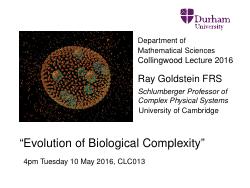The 2015/16 Collingwood Lecture
Professor Ray Goldstein FRS (University of Cambridge)
"Evolution of Biological Complexity"
10 May 2016, 4.00pm, CLC013 (Calman Learning Centre)
Professor Ray Goldstein received his PhD in 1988 from Cornell University and has held academic appointments at the University of Chicago, Princeton University and the University of Arizona. He was appointed Schlumberger Professor at the University of Cambridge in 2006. He is an internationally recognised leader in the fields of biological physics and nonlinear dynamics. He is distinguished for having made important mathematical contributions to those subjects as well as pioneering experimental discoveries. His broad-ranging contributions include classic work on the dynamics of pattern formation driven by long-range forces, the differential geometry of interfacial pattern formation, and the explanation for the shapes of stalactites. He has made seminal experimental contributions to the study of active matter, including developing a class of green algae as model organisms for the study of biological fluid dynamics, the physics of multicellularity, and the synchronization of eukaryotic flagella. Professor Goldstein was elected a Fellow of the Royal Society in 2013.
Abstract: Long after the first unicellular organisms arose in the primordial soup, they evolved to become multicellular and to divide up life’s processes into distinct cell types. One of the most fundamental issues in evolutionary biology is the nature of this transition: What is the advantage of being larger? What are the driving forces behind the appearance of distinct cell types? In this talk I will describe an approach to these questions based on the study of a particular class of organisms, using experimental techniques from physics and fluid dynamics, and the interpretation of those experiments with mathematical techniques from the area of stochastic nonlinear dynamics.
